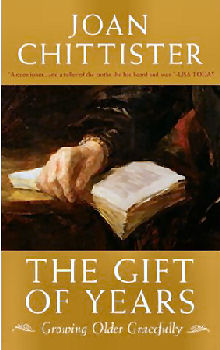
|
Posted July 2, 2008
Book: The Gift of Years: Growing Old Gracefully Author: Joan Chittister Blue Bridge. New York. 2008. Pp. 222 An Excerpt from the Jacket:
An Excerpt from the Book: In youth we learn, Marie von Ebner-Eschenbach wrote when she was seventy-five years old, in age we understand. Clearly, here was a woman who understood the function of age, the role of the elderly. Understanding is the bedrock of a society. It enables us to see why we do what we do, to realize why we cannot do what we want to do in all instances. It is in the development of understanding for the next generation, in the cocreation of the world, that the older generation has so serious a role to play. The service of that the whole world needs from the elders is not the service of hours spent and time put in and documents finished and machines fixed. There are untold numbers of people who can do all of those things. No, the service of the elders is not a service of labor, it is a service of enlightenment, of wisdom, of discernment of spirits. Only the carriers of generations past can give us those things, because wisdom is what lasts after an experience ends. We cannot expect wisdom as a wholesale item of the young then, because they simply have not lived long enough or through enough to have been able to amass much of it. Oddly enough, this period in life when we finally get t the point that we really understand some things about living well is when we feel most out of it. It is, far too often, exactly the time when people who know more than they have ever known begin to feel useless. Out of the mainstream of the middle years, not going into the office or the store or the bus barn anymore, not responsible for the meetings or the committees or the children or the family or the business, we begin to doubt that there is any role left for us in life. After all, everything that ever gave us status or influence at all has simply dried up, disappeared or moved on. Table of Contents: Regret Meaning Fear Ageism Joy Authority Transformation Newness Accomplishment Possibility Adjustment Fulfillment Mystery Relationships Tale-telling Letting go Learning Religion Freedom Success Time Wisdom Sadness Dreams Limitations Solitude Productivity Memories Future Agelessness Immediacy Nostalgia Spirituality Loneliness Forgiveness Outreach The present Appreciation Faith Legacy Afterword: The Twilight Time |
|
